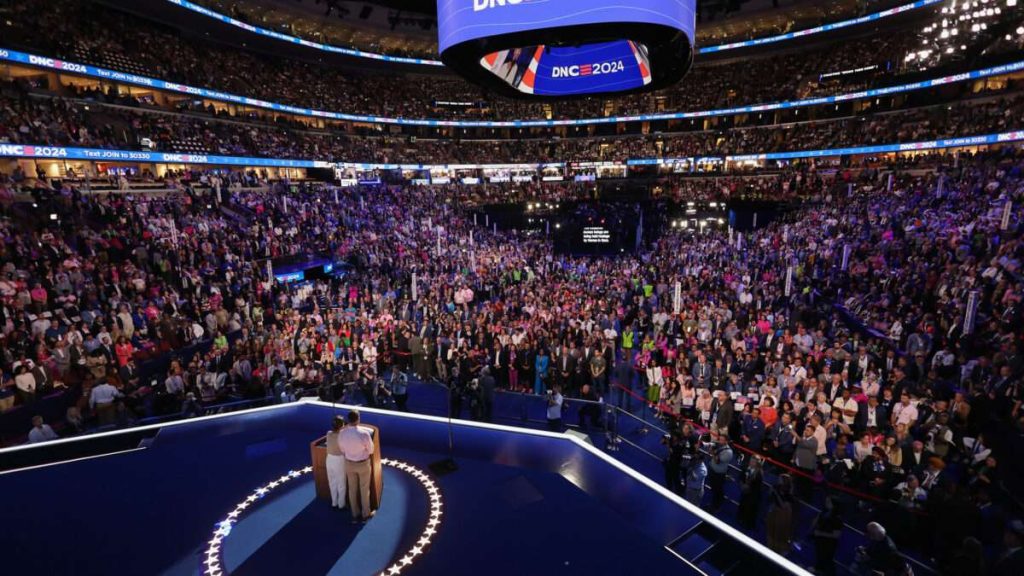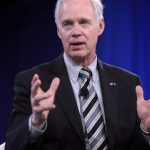Rachel Goldberg and Jon Polin came to the Democratic National Convention on Wednesday with a message they said was “not a political issue.” The Israeli-American couple’s son, Hersh Goldberg-Polin, was at a music festival during the October 7, 2023, attacks on Israel. A grenade blew his arm off, and Hamas fighters took him hostage.
“In a competition of pain, there are no winners,” Polin said. “In an inflamed Middle East, we know the one thing that can most immediately release pressure and bring calm to the entire region: A deal that brings this diverse group of 109 hostages home and ends the suffering of the innocent civilians in Gaza. The time is now.”
He added that kol adam olam umlo’o, a Hebrew saying meaning “every human being is an entire world” that is paraphrased from the Talmud.
Outside the convention center that night, former congressional staffer and convention delegate Abbas Alawieh was leading a livestreamed protest. Uncommitted delegates like Alawieh, representing those who had declined to vote for President Joe Biden in the primary, were demanding that the Democratic Party also allow a Palestinian American speaker on stage to share their people’s story.
Alawieh himself had lived that story. As an American teenager visiting his family in southern Lebanon, he witnessed the Israeli invasion of 2006.
“I thought that 100 percent I would be killed using bombs that my government was sending over there,” he said. “I remember what those bombs feel like when they drop. I remember how your bones shake within your body. I remember what they smell like. I remember what the dust feels like when it fills the room after a bomb drops and I can’t even see my own hand in front of my face.”
He added that he was “privileged” to hear the humanistic message of Polin and Goldberg at the convention, and echoed Polin’s reference to the Talmud. “I was thinking about how in the Muslim tradition, we know that if you harm or if you kill any one person, it’s as if you harmed or killed all of humanity,” Alawieh said, paraphrasing a verse from the Quran.
The Israeli-Palestinian conflict is probably the most intense foreign policy issue in U.S. politics, threatening to break apart the Democratic coalition. At stake are hundreds of thousands of Muslim, Jewish, Arab Christian, and other voters in swing states, including over 100,000 people in Michigan and 88,000 people in North Carolina who voted uncommitted in the Democratic primaries.
In theory, all the major Democratic factions have the same goal. Biden and Vice President Kamala Harris say that they want a ceasefire. So do many of the Israeli hostage families invited to speak at Democratic events and the Palestinian-American voters protesting against the party. When a heckler chanted “Free the hostages” at Alawieh’s protest, uncommitted supporters reportedly chanted back, “We agree!”
“President Biden and I are working to end this war such that Israel is secure, the hostages are released, the suffering in Gaza ends, and the Palestinian people can realize their right to dignity, security, freedom and self determination,” Harris said on Thursday night.
But move from the realm of rhetoric to the realm of action, and the fault lines become clearer.
While calling for diplomacy, the Biden administration has also rushed weapons to Israel at the American taxpayer’s expense. (Harris also promised on Thursday that she “will always ensure that Israel has the ability to defend itself.”) Some hostage families, including the Goldberg-Polin family, have asked the U.S. government to push harder on the Israeli leadership to accept a ceasefire. The Uncommitted movement believes that nothing short of a total weapons cutoff can move Israel.
This question—whether the Biden administration is seriously working towards a ceasefire—has also divided the progressive wing of the party. Rep. Alexandria Ocasio-Cortez (D–N.Y.) said in her Tuesday convention speech that Harris “is working tirelessly to secure a ceasefire in Gaza and bring the hostages home.”
Rep. Ilhan Omar (D–Minn.) rebuked her in a speech outside the convention hall. “It’s been unconscionable for me the last ten months to witness my colleagues in this administration refusing to recognize the genocidal war that is taking place in Gaza,” Omar said. “‘Working tirelessly’ for a ceasefire is really not a thing, and they should be ashamed of themselves.”
The Uncommitted movement had publicly hoped that replacing Biden with Harris would also mean a shift in administration policy. Harris’ foreign policy team includes figures like Philip Gordon, a skeptic of U.S. wars in the Middle East, and Ilan Goldenberg, an Israeli-American peace negotiator who has called for recognizing the State of Palestine. Recent polling shows that an arms embargo would win more votes than it would lose in swing states.
The Democratic National Convention would put those hopes to the test. Unlike the outside protesters who threatened to disrupt the convention, the Uncommitted movement played the inside track, negotiating with Democratic leadership and playing up the movement’s willingness to help elect Harris.
“Michigan voters want to support you, but we need a policy that will save lives in Gaza right now,” Layla Elabed, cofounder of the Uncommitted movement and sister of Rep. Rashida Tlaib (D–Mich.), reportedly told Harris when they met earlier this month.
Meanwhile, many hostage families have grown to see Israeli Prime Minister Benjamin Netanyahu as an obstacle to saving their relatives from Hamas. Rather than negotiating for a prisoner exchange in good faith, they believe he is dragging out the war, endangering hostages’ lives in the process.
During hostage negotiations last month, Netanyahu added new demands for a permanent Israeli presence in Gaza that members of his own negotiating team reportedly worried would torpedo the talks. On Tuesday, a U.S. official accused Netanyahu of making “maximalist statements” that are “not constructive” to securing a deal.
“There’s a myth out there that there’s a better deal somewhere, if Israel just delays a little longer and fights a little further. Every day, another hostage can die, including all of our loved ones, those who may still be alive,” Jonathan Dekel-Chen, father of a hostage, said in a July 2024 congressional roundtable. “Any true friend of Israel today must pressure our prime minister to finish the deal.”
By then, more hostages had died in captivity—some of them mistakenly killed by Israeli troops—than the Israeli army had rescued.
Netanyahu spoke to Congress a day after the roundtable. Hostage families teamed up with pro-Palestinian progressives to protest him. Omar gave her seat to Zahiro Shahar Mor, the nephew of a hostage; Mor was arrested by Capitol Police for heckling Netanyahu, alongside five other hostage relatives who wore t-shirts calling on Israel to “seal the deal.”
That demand is easy enough to square with the old Democratic consensus on Israel. An Israeli is pushing for a change in his government’s wartime policy for the sake of Israeli victims. The Uncommitted movement, however, believes that peace can only come if the U.S. stops arming the Israeli military altogether. (“You want the bombs to stop? You stop sending bombs,” Alawieh said at his Wednesday protest. “It’s a very simple idea, Mr. President.”) And it is driven by a Palestinian perspective first and foremost.
Ahmad Awad, an Uncommitted delegate for New Jersey, has Palestinian ancestry on his father’s side and Polish ancestry on his mother’s side. “I hold the Palestinian cause very near and dear to my heart. It’s something that I have experienced firsthand when I visited family and visited Palestine. I’ve experienced the discrimination. I’ve experienced the apartheid, the occupation, the hell that my people have been put through,” he says.
His Polish grandfather was “forcibly removed from his town and shipped off to slave labor camps with his family” during World War II and was forced to stay in a displaced persons camp after the war, according to Awad. “It definitely impacts how I move forward. I’m going to voice concern for human rights and for human dignity, wherever it may be. It’s not exclusive to the Palestinian cause,” he says.
Democratic leadership has been skittish about airing that kind of perspective in public. Several weeks before the convention, the Uncommitted movement publicly asked the Democratic National Committee to allow a speech by Tanya Haj-Hassan, a doctor who had served in Gazan hospitals during the war.
The Harris campaign privately told the Uncommitted leadership that it would be open to a private meeting. However, as soon as news of those talks became public in early August, the Harris team stated that they were not open to discussing an arms embargo, and Harris herself made a show of talking down Palestinian protesters at a campaign rally.
As negotiations with the Harris campaign dragged on, the Uncommitted movement dropped the demand to have Haj-Hassan speak and presented a list of Palestinian Americans to choose from. On Wednesday night, the campaign rejected all of the names on the list, and Alawieh immediately organized his protest in response, according to Palestinian-American writer Y.L. Al-Sheikh, who is close to Uncommitted but not an official delegate.
“It seems to me like they expected us to just roll over and not make a fuss, but in reality we made a rather symbolic ask, and made it in a very conservative manner by providing them with options, and they rejected it out of hand before seeing a single speech draft,” she says. “At the end of the day, in my humble opinion, even the most conciliatory speech possible by a Palestinian American would be bad in the DNC’s view because her very presence on the stage forces people to some degree to reckon with what the party has supported.”
In a last-ditch attempt to force the Democratic Party’s hand, a copy of Georgia state Rep. Ruwa Romman’s draft speech was leaked to the progressive magazine Mother Jones.
Democrats have “stood together, demanding to enforce our laws on friend and foe alike to reach a ceasefire, end the killing of Palestinians, free all the Israeli and Palestinian hostages, and to begin the difficult work of building a path to collective peace and safety,” the draft speech says. It endorses Harris, criticizes former President Donald Trump for using “Palestinian” as a slur, and does not call for an arms embargo.
A growing chorus of voices called for the Democratic National Committee to include Romman, among them several members of Congress, the United Auto Workers union, and the relative of several Israeli hostages.
“Rachel and Jon deserved every second on that stage. I also believe a Palestinian American voice deserves to be heard on that stage,” Alana Zeitchik, six of whose family members were taken by Hamas, wrote on social media. “I’d love to hear from [Romman] and I hope the DNC will give her the chance to be heard.”
Democratic leadership rejected all of those entreaties. “I think we’ve given them a lot of opportunities to engage in this process at the convention. People have had dedicated panels during the daytime programming,” Harris campaign adviser Ian Sams told CNN. (Uncommitted was allowed to hold an off-site event with a group of doctors who had served in Gaza.)
Senate Majority Leader Chuck Schumer (D–N.Y.) brusquely told NBC that “we’re not going to get any problems for lack of diversity.”
Romman ended up reading her speech to a gaggle of reporters on the sidewalk outside the convention center. Uncommitted and other anti-war delegates held a silent protest in the hallway of the center. So far, the Uncommitted movement is still committed (no pun intended) to the inside track. Just before Romman’s sidewalk address, Alawieh issued a new demand: a meeting with Harris by September 15.
But many Palestinian and anti-war voters are not Democratic partisans. For them, Harris is clear enough on where she stands, and continuing to beg the Democratic Party for concessions may not be worth the effort.
“Palestinians and pro-Palestinian voters are officially checked out now,” says Abdelhalim Abdelrahman, a Palestinian-American writer from Michigan who voted uncommitted in the primaries and canvassed for Justin Amash’s Senate campaign. “The Democrats denying the request for a Palestinian speaker at the DNC showed a lot of Palestinians and their supporters that there’s no room for Palestinians in the supposed big tent Democratic Party.”
The post Israelis and Palestinians Found Common Ground at the DNC. Is That Enough? appeared first on Reason.com.







